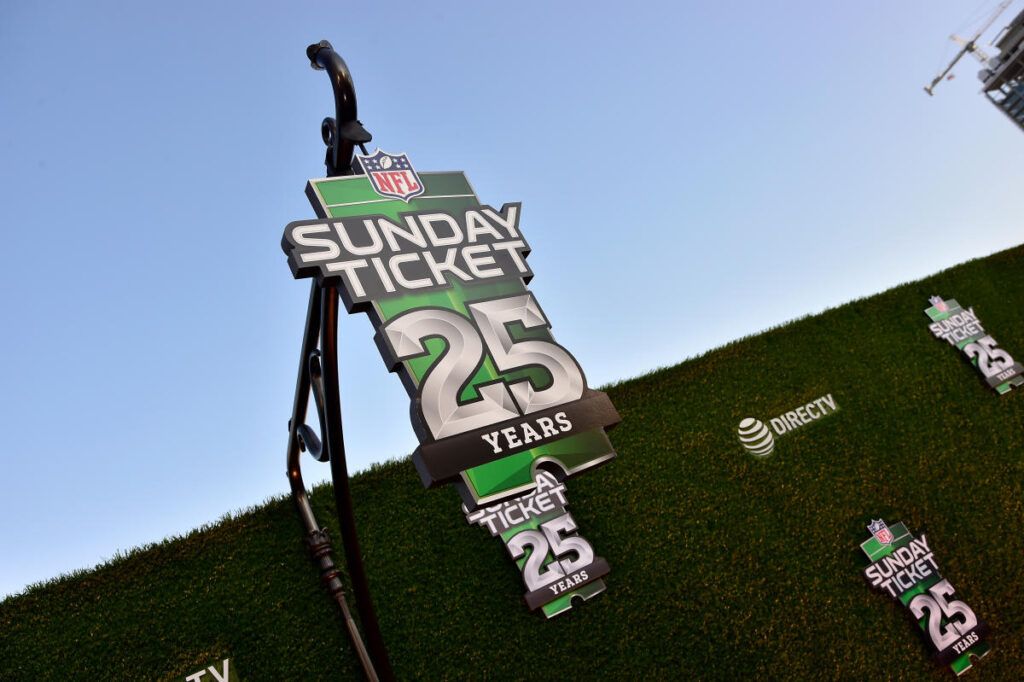In Los Angeles, the league is in the midst of a trial expected to last three weeks to determine whether the NFL allowed DirecTV to sell broadcasts of out-of-market games at inflated prices from 2012 through 2022 through its “Sunday Ticket” package.
The class action lawsuit, representing about 2.5 million customers, including individuals and bar owners, alleges that the NFL violated antitrust laws to restrict competition in order to protect its lucrative contracts with Fox and CBS for Sunday afternoon games. The lawsuit seeks $7.1 billion in damages, which could be tripled to more than $21 billion.
DirectTV was the exclusive distributor of “NFL Sunday Ticket” from the 1994 season until 2022. YouTubeTV took over in 2023. It costs an additional $349 per season on top of the YouTubeTV price ($72.99 per month).
The plaintiffs argue that the NFL set Sunday Ticket prices artificially high to make money from desperate, enthusiastic fans willing to pay any amount to see their favorite team or a particular out-of-market game, and from bars that need to draw customers.
But in doing so, the lawsuit alleges, the NFL barred most fans from attending games and forced them to watch games broadcast on local television, protecting local broadcast deals with Fox and CBS that pay the NFL billions of dollars.
It also intentionally limited the number of potential customers by making Sunday Ticket an exclusive service of DirectTV, which has only 13 million subscribers and requires the installation of a satellite dish, rather than the much more accessible basic cable or streaming options.
The NFL argues that this is a premium service and therefore commands a premium price.
“This case is about choices,” NFL lawyer Beth Wilkinson told jurors, according to the Associated Press. “This is a valuable premium product. Think about the options available to your fans. We want as many people as possible to watch free-to-air content.”
Additionally, throughout the nine years of this case (which has been going smoothly since 2015), the league has argued at various points that it is protected by an antitrust exemption, meaning that if it did what it is accused of doing, it was allowed to do it. If the league loses this case, it is expected to be appealed all the way to the Supreme Court.
So, let's take a look.
That's a huge amount, even for a sports league that's set to make $18.6 billion in revenue in 2022 and whose team owners are among the richest people in the world. Perhaps customers can get some refunds.
But perhaps more importantly, is whether the lawsuit could change how out-of-market games are offered to consumers, and at what price.
Legal or not, the current system is cumbersome and lacks choice and cost-effectiveness for many fans.
For example, AppleTV offered to make Sunday Ticket part of its service at no extra cost, and according to CourthouseNews.com, emails submitted as evidence state that ESPN only wanted to charge $70 for the entire season and offer the option to purchase just one team's games.
The NFL balked at both proposals. While other sports leagues, such as the NBA's League Pass and the NHL's Center Ice, are available through multiple providers, the NFL opted to make DirectTV (and later YouTubeTV) pay a fee to be the exclusive provider of Sunday Ticket, thereby limiting the number of fans who could use it.
“We're not looking to draw large crowds. We want to keep it a premium service,” New England Patriots owner Robert Kraft said in testimony submitted to the trial, according to CourthouseNews.com.
The NFL is a cash-generating machine, and this may have contributed greatly to the bottom line for franchise owners, but for fans, greater accessibility to the product would be preferable, especially the ability to order ala carte at low prices.
For example, a Philadelphia fan living in Chicago who just wants to watch Eagles games currently has to subscribe to YouTube TV for $72.99 a month and then buy Sunday Ticket ($349) for access to every Sunday afternoon game.
To make matters worse, 12 of Philadelphia's 17 games in 2024 are currently scheduled to kick off on Sunday afternoons (and thus be part of the Sunday Ticket window), and some of them, particularly the two against Dallas, will likely be nationally broadcast and therefore broadcast in Chicago as well.
Eagles fans could potentially shell out $349 to watch just seven or eight games, plus $50 per broadcast, and that doesn't include the season opener against the Packers, which will air exclusively on Peacock, another cost.
The best way to do this is to allow fans to purchase individual games (for example, $5.99 or $9.99) with the TV provider they already subscribe to. If they want to watch, they'll pay to watch. If they can't or don't want to buy it, they won't buy it.
Access will increase exponentially, which is a win-win for consumers.
Sunday Ticket was set up to make the service unavailable or too expensive for fans, offering a ton of games most people don't want to watch, and fans can just watch whatever their local affiliates are showing. This was done to protect the NFL broadcasters (CBS and Fox), or more accurately, the fees the NFL could charge its broadcast partners.
The jury may be out on that, and if so, the question will not be how much the NFL must pay, but how much it must reform its product for football fans around the world.

